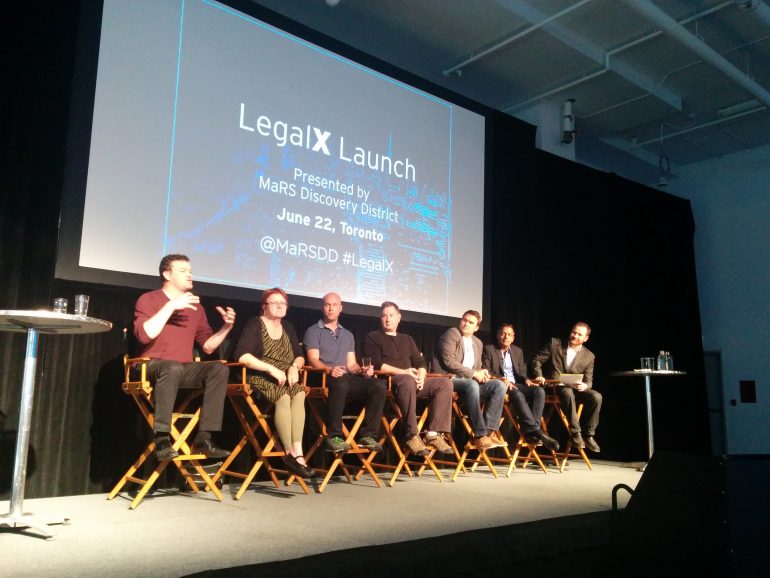MaRS’ announcement on the launch of LegalX, its latest industry cluster aimed at moving the legal sector forward through tech, came via an event hosted at the Discovery District that brought together entrepreneurs, academics, and lawyers for a discussion on the future of the legal industry and up-and-coming legal tech startups.
Aron Solomon, innovation lead at LegalX, noted that the cluster has been in the works for the past 18 months. Solomon and Jason Moyse, the manager of legal business solutions at Elevate Services, are the two masterminds behind LegalX.
“When people around the world think of legal innovation, the number one spot in the world they’re going to think about is LegalX at MaRS.”
“Law is still a very traditional profession,” said Moyse. “It’s very much tied to a law firm partnership model where they bill by the hour. Conversely, their clients have also started to push away from the billable hour and are seeking approaches that are based on value. So those pressures are what are starting to really hit legal, and there’s a lot of resistance to it by lawyers, particularly at large firms as they’ve made a good living by following a model that’s been around for a long time.”
“When people around the world think of legal innovation, the number one spot in the world they’re going to think about is LegalX at MaRS,” Solomon added. “We’re here to connect capital, product, ideas and people. It’s gonna be this amazing synergy between all of these things.”
The event kicked off with pitches from LawScout, a MaRS-based legal tech startup that connects small businesses with legal services, and Beagle, an interactive contract analysis company currently participating in the Microsoft Ventures Accelerator program in Seattle.
The panel that followed had industry leaders discussing the ways that the legal industry was changing thanks to the advancement of technology. The panelists included Monica Bay, a Fellow at CodeX: The Stanford Center for Legal Informatics; Sanjay S. Kamlani, executive director of Matterhorn Transactions; Mitch Kowalski, author of Avoiding Extinction: Reimagining Legal Services for the 21st Century, Dan Lear, director of industry relations at Avvo Inc.; Cian O’Sullivan, founder of Beagle; and Noah Waisberg, CEO and co-founder of Kira Inc.
#legalx @MonicaBay: "I want to see law firms invest in people other than those with law degrees"
— Connie Crosby (@conniecrosby) June 22, 2015
One issue that was often brought up was the industry’s resistance to change, and how lawyers could address that. “Working at Avvo, we’re no longer a startup, but we’ve certainly been acting like one,” said Lear. “One of the interesting things that I’ve learned when I came in is that my ‘lawyerliness’ is actually not that helpful and is sometimes counterproductive. Innovation and disruption in law looks a lot like any other sector; it’s people focused on solving a problem very effectively, efficiently and better than someone else has.”
Kowalski expanded on that point, saying that lawyers need more freedom to fail. “As lawyers we’re trained as much as possible, that failing is bad. It’s ingrained in us not to take any risks, but we’re not given the room to try new ideas, have those ideas blow up and then pull something from it. We don’t have that safety.”
Will it help if lawyers reminded themselves that they are clients too? Sort how doctors forget what it feels like to be a patient. #LegalX
— Shreya Gupta (@ShreyaT) June 22, 2015
Another shift in the legal tech world is the fact that it’s not just benefitting lawyers – it’s also benefitting the clients who may lack legal expertise access service more efficiently and for more value.
“I want us to stop thinking about what the impact is on the lawyers, I want us to start thinking more about what are the issues facing the clients,” said Bay. “We’ve been so wrapped up in how to use tech to solve legal problems, but let’s solve the client’s problems while we’re at it.”


